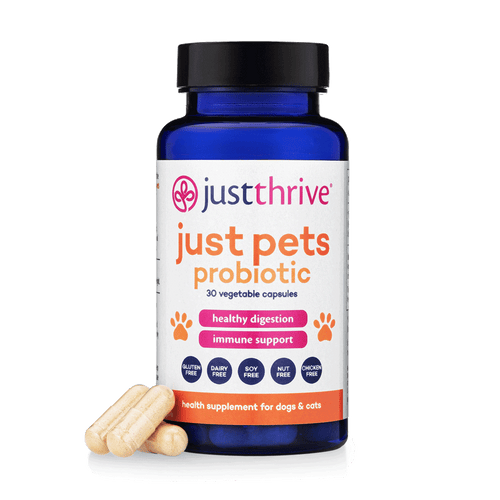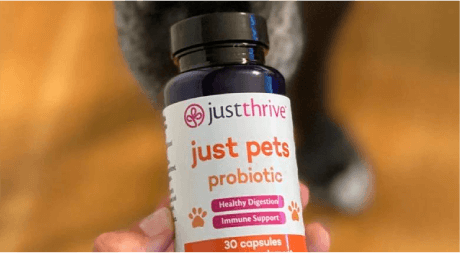Low energy… Extra discomfort… Strange itchiness… Unusual mood disturbances.
Every now and then, this is just a normal part of being a dog. But if these issues last longer then seems normal, they may be a red flag.
This can be perplexing, especially if the persistent issue seems to have no obvious cause.
If your dog is dealing with a strange health or behavioral challenge, the answer you both are looking for might be found by going with their gut…
More specifically, their “leaky” gut.
As it turns out, many different discomforts – from GI issues to bad behavior – can often be attributed to leaky gut in your pup.
That’s why understanding leaky gut can be the first step toward giving your dog the right support she/he needs.
What Is Leaky Gut?
Your dog’s intestines come with a special mucosal lining called the gut barrier. This protective barrier acts like a filter, allowing nutrients to reach the bloodstream while keeping pathogens, undigested food particles, parasites, viruses, and toxins out.
Unfortunately, your dog’s gut barrier is VERY sensitive and can be damaged by things like:
- Artificial or highly processed foods
- Antibiotics and other medications, like NSAIDs and steroids
- Pesticides – like glyphosate – that linger in soil, water, and air
- Flea and tick treatments that contain pesticides
- Environmental toxins, like household cleaners or heavy metals
- Gut infections
- Dysbiosis, a condition caused by the overgrowth of harmful bacteria in your dog’s gut
When the gut barrier gets damaged, all of those toxins and bad actors leak out, escaping through the broken gut lining and pool into the bloodstream. And once they enter your dog’s circulation, they can cause damage anywhere in their body.
Your dog’s immune system will respond to these unwanted substances and do its best to defend against them. But oftentimes this results in an unhealthy, system-wide inflammatory response that triggers many other symptoms.
The symptoms may come on suddenly, and will often seem to have no logical cause and effect.
That’s why, in order to best support your pup, it’s important to become familiar with the many signs of leaky gut in dogs.

8 Signs of Leaky Gut in Dogs
If your pup has leaky gut, they’re probably suffering from at least one – and probably more – of these “mysterious cause” symptoms:
- Digestive problems, like diarrhea, vomiting, gas, and bloating
- Food allergies, especially new ones
- Skin problems, like hotspots and rashes
- Joint pain and tenderness
- Wheezing or trouble breathing
- Unusual fatigue and low energy
- Behavior issues, like aggression or separation anxiety
- Sudden appetite changes or unusual weight gain or loss
These symptoms often point toward a leaky gut… but it can be very hard for even your vet to properly diagnose.
That’s partly because these symptoms may seem to have other causes, and partly because the symptoms can shift – for example, itchy skin can disappear but be replaced by fatigue or joint pain.
But the longer leaky gut goes untreated, the more intense your dog’s discomfort will become.
That's why the best way to help your dog is to proactively support a healthy gut barrier and a healthy gut microbiome.
Leaky Gut and Dysbiosis
Your dog has a gut microbiome (similar to yours) that plays a huge role in their health… and not just their gut health.
When your pup’s gut microbiome is in healthy balance, it contains trillions of beneficial (probiotic) bacteria in many different varieties – and much fewer harmful bacteria (pathogens).
Beneficial bacteria produce many enzymes and health-supportive compounds that protect and preserve a strong gut barrier. Plus, since 70-80% of your dog’s immune system is in their gut, those probiotic bacteria help to keep your dog feeling their best.
But when there’s an imbalanced microbiome, and pathogens greatly outnumber probiotic bacteria, your dog’s gut falls into a state of dysbiosis (the imbalance of gut bacteria). As the pathogens multiply, the toxins they produce attack the mucosal gut barrier creating micro tears that ultimately lead to a leaky gut.
Fortunately, you can help keep your dog’s gut microbiome in proper balance and support healthy gut barrier function with specially formulated probiotics.
Probiotics for Dogs
We share a lot with our dogs – walks, snuggles, sofas, and sometimes “people” food. But when it comes to probiotics, yours won’t do. So you’ll want to use probiotic supplements specifically formulated for dogs’ microbiomes.
Scientific studies show that giving proper probiotics to dogs can help maintain a healthy balance of gut bacteria and support optimal gut barrier function.
In fact, a specially formulated spore probiotic supplement for dogs demonstrated exciting results when it was clinically studied in dogs experiencing diarrhea and vomiting. Researchers tested a dog-focused supplement containing two probiotic strains: Bacillus subtilis and Pediococcus acidilactici. They gave the supplement to 11 dogs – some healthy, some with GI distress – for 30 days… with stunning results:
- GI issues were addressed
- Leaky gut markers dramatically fell
- Flatulence was reduced in healthy dogs
- No healthy dogs experienced adverse reactions
The right kind of pet probiotic has the potential to maintain healthy balance in the gut microbiome and support the strength of the gut barrier for your dog. And a clinically proven spore probiotic can work wonders in keeping your pup feeling their best.
Keep Your Dog’s Gut Happy with Just Pets Probiotic
Just Pets Probiotic contains Bacillus subtilis and Pediococcus acidilactic, two strains of probiotics proven effective for supporting your dog’s gut.
Adding just one capsule to your dog’s food daily can help:
- Maintain optimal balance in the gut microbiome
- Promote a healthy digestive system
- Drive a healthy immune function
- Support a strong gut barrier
To help your dog put their best paw forward, treat them to Just Pets Probiotic today.












